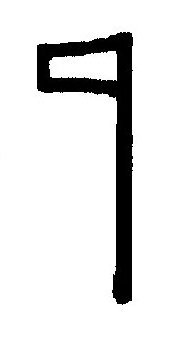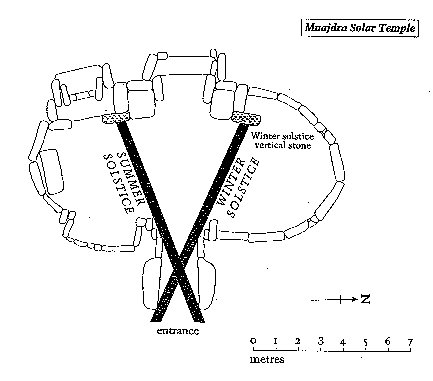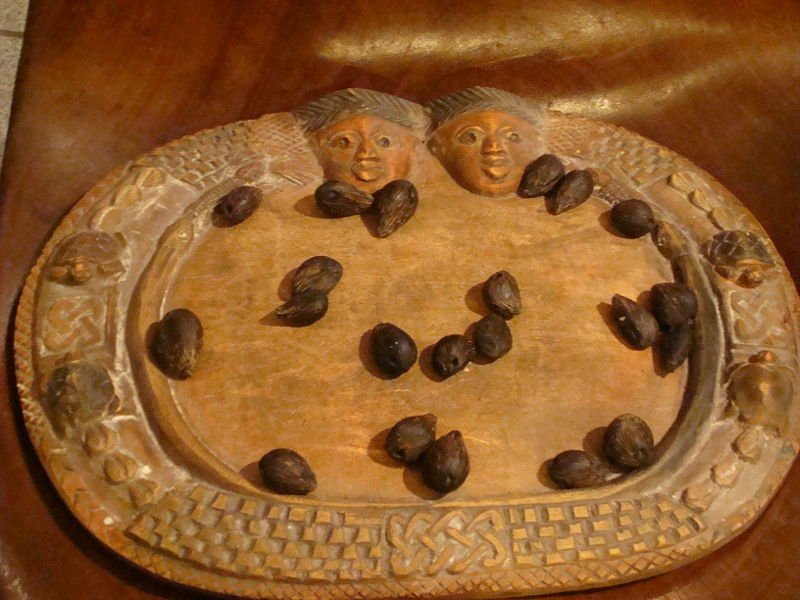Bb5.2
According to Hevelius the Horn of the Unicorn stretched across
the Milky Way (like a bridge) to the right forearm of Orion, who
was looking back →
Postvorta, i.e. in contrast to the
Twins who were moving up (→
a.m.) while facing each other.
... Janus was perhaps not originally
double-headed: he may have borrowed this peculiarity from the
Goddess herself who at the Carmentalia, the Carmenta Festival in
early January, was addressed by her celebrants as 'Postvorta'
and 'Antevorta' - 'she who looks both back and forward' ...

Offspring (hua) will arrive after spring, i.e. after
midsummer ('noon').
|
Sumerian SAG |
 |
Phoenician resh |
 |
Greek rho |
Ρ
(ρ) |
|
... Resh (Arabic: rāۥ)
is the twentieth letter of many Semitic alphabets,
including Phoenician, Aramaic, Hebrew ... The word
resh is usually assumed to have come from a
pictogram of a head, ultimately reflecting Proto-Semitic
*raۥ(i)š-.
The word's East Semitic cognate, rēš-, was one
possible phonetic reading of the Sumerian cuneiform sign
for 'head' (SAG).

.jpg)
... Then I become
aware of ... a presence - a faint, ghostly glimmering,
like moonglow, that has appeared on the solstice stone.
I don't know how long it lasts, a second or two only I
would guess, but while it is there it seems less like a
projection - which I know it to be - than something
immanent within the stone itself. And it seems to
function as a herald for it fades almost as soon as it
has appeared and in its place the full effect snaps on -
instantaneously. It wasn't there, and then it's there.
As Chris had described, the effect does curiously
resemble a poleaxe, or a flag on a pole, and consists of
a 'shaft', narrow at the base but widening a little
towards the top, running up the left hand side of the
solstice stone, surmounted by a right-facing 'head' or
'flag'. An instant later an almond-shaped spot of light,
like an eye, appears a few centimeters to the right of
the 'flag' and the effect is complete. Weirdly - I do
not claim it has any significance - this flag-on-a-pole
symbol is the ancient Egyptian hieroglyph neter,
meaning 'god', or 'a god' - and not to be understood at
all in the Judaeo-Christian usage of that word but
rather as a reference to one of the supernatural powers
or principles that guide and balance the universe.
Manifested here, in this strange Stone Age temple, it
glows, as though lit by inner fire ...

Marija Gimbutas: 'To sleep within the Goddess's womb was
to die and to come to life anew'. In a system of
reincarnation the old one must die in order to be
reborn, of course. At midsummer Sun comes to a
standstill, and this must therefore be an occasion when
the 'flame of life' had to be transported into a new
body |
Which means we could identify the word
verega given by Metoro with the one 'who was looking back'
(towards spring):
|
vere |
to
weed |
spring |
a.m. |
Antevorta |
|
verega |
fruitful |
autumn |
p.m. |
Postvorta |
... Another year passed, and a man by the
name of Ure Honu went to work in his banana plantation.
He went and came to the last part, to the 'head' (i.e., the
upper part of the banana plantation), to the end of the banana
plantation. The sun was standing just right for Ure Honu
to clean out the weeds from the banana plantation.
On the first day he hoed the weeds. That went
on all day, and then evening came. Suddenly a rat came from the
middle of the banana plantation. Ure Honu saw it and ran
after it. But it disappeared and he could not catch it. On the
second day of hoeing, the same thing happened with the rat. It
ran away, and he could not catch it. On the third day, he
reached the 'head' of the bananas and finished the work in the
plantation. Again the rat ran away, and Ure Honu followed
it. It ran and slipped into the hole of a stone. He poked after
it, lifted up the stone, and saw that the skull was (in the
hole) of the stone. (The rat was) a spirit of the skull (he
kuhane o te puoko). Ure Honu
was amazed and said, 'How beautiful you are! In the head of the
new bananas is a skull, painted with yellow root and with a
strip of barkcloth around it.' Ure Honu stayed for a
while, (then) he went away and covered the roof of his house in
Vai Matā. It was a new house. He took the very large
skull, which he had found at the head of the banana plantation,
and hung it up in the new house. He tied it up in the framework
of the roof (hahanga) and left it hanging there ...
Rega. Ancient word,
apparently meaning 'pretty, beautiful'. It seems to have been
used also to mean 'girl' judging from the nicknames given young
women: rega hopu-hopu. girl fond of bathing; rega
maruaki, hungry girl; rega úraúra, crimson-faced
girl. Vanaga. Pau.: rega, ginger. Mgv.: rega,
turmeric. Ta.: rea, id. Mq.: ena, id. Sa.: lega,
id. Ma.: renga, pollen of bulrushes. Churchill.
→ ve-rega.
|
Jan
9 |
10 |
11 |
12 |
13
(378 → Saturn) |
 |
 |
 |
 |
 |
|
Bb5-1 |
Bb5-2 |
Bb5-3 (166) |
Bb5-4 |
Bb5-5 (589) |
|
Ki te manu gutu roaroa |
kua hahata ia te vaha ona |
mai tae tanu
hia te
tau moko |
e manu rere |
ki te mauga |
|
Tanu. To cover something in the ground
with stones or soil; to bury a corpse; tanu kopú,
to bury completely; this expression is mostly
used figuratively: ka-tanu kopú te vânaga tuai
era, ina ekó mana'u hakaou, forget those old
stories, don't think of them again. Vanaga. To bury,
to plant, to sow seed, to inter, to implant, to
conceal; tagata tanukai, farmer; tanuaga,
burial; tanuaga papaku, funeral; tanuga,
plantation; tanuhaga, funeral, tomb. P Pau.:
tanu, to cultivate. Mgv.: tanu, to
plant, to bury. Mq.: tanu, to plant, to sow.
Ta.: tanu, to plant, to sow, to bury.
Churchill.
Moko.
1. Lizard; moko manu uru,
figurine of a
lizard (made of wood). 2. To throw oneself on
something, to take quickly, to snatch; to flee into
the depths (of fish); tagata moko,
interloper, intruder, someone who seizes something
quickly and swiftly, or cleverly intrudes somewhere;
ka-moko ki te kai, ka-moko, ka-aaru, quickly
grab some food, grab and catch. 3. To throw oneself
upon someone, to attack: he-moko, he-reirei,
to attack and kick. 4. Moko roa: to make a
long line (of plantation); moko poto, to make
a short line. 5. Ihu moko; to die out (a
family of which remains only one male without sons);
koro hakamao te mate o te mahigo, he-toe e-tahi
tagata nó, ina aana hakaara, koîa te me'e e-kî-nei:
ku-moko-á te ihu o te mahigo. when the members
of family have died and there remains only one man
who has no offspring, we say: ku-moko-á te ihu o
te mahigo; to disappear (of a tradition, a
custom), me'e ihu moko o te tagata o te kaiga
nei, he êi, the êi is a custom no longer
in use among the people of this island. Vanaga. 1.
Lizard. P Pau., Mgv., Mq.: moko, id. Ta.
moó, id. 2. To stun, to be dizzy. PS Sa.:
mo'o, to be surprised. Hakamoko, to
accomplish. Mokohi, grain, full-grown berry (mokoi);
mokohi haraoa, grain. Mgv.: mokohe,
food. Mokoimokoi, heart T, kidney.
Mokomoko, sharp, pointed, slender, cape,
headland; gutu mokomoko, pointed lips.
Churchill. Mgv.: mokora, a duck. Ta.:
moora, id. Churchill. ... A
une certaine saison, on amassait des vivres, on
faisait fête On emmaillotait un corail, pierre de
défunt lezard, on l'enterrait, tanu. Cette
cérémonie était un point de départ pour beacoup
d'affaires, notamment de vacances pour le chant des
tablettes ou de la priére, tanu i te tau moko o
tana pure, enterrer la pierre sépulcrale de
lézard de sa prière ...
Maúga. 1. Last; aga maúga
o te Ariki o Hotu Matu'a, King Hotu Matua's last
work. 2. Hill, mountain. Mouga, moúga. Last;
vânaga moúga o te Ariki O Hotu Matu'a, the
last words of King Hotu Matu'a. Vanaga. Mauga
kore, impalpable. Mouga. 1. Enough,
that's all, at last. 2. Mountain, ridge of hills;
mouga iti, hillock; tua mouga, mountain
top; hiriga mouga; hillside, declivity,
slope. P Pau.: mahuga, mountain. Mgv.: mou,
maga, mountain. Mq.: mouna, mouka,
peak or crest of a mountain. Ta.: maua,
moua, mountain. 3. Extinction, end,
interruption, solution; te mouga o te hiriga,
end of a voyage; pagaha mouga kore, without
consolation. 4. To get. Churchill. |
|
ALUDRA (Virgin) =
η
Canis Majoris
(111.1),
PROPUS = ι
Gemini (111.4),
GOMEISA (Water-eyed) = β Canis Minoris
(111.6)
*70.0 = *111.4 - *41.4 |
ρ Gemini
(112.1),
Eskimo
Nebula = NGC2392 Gemini
(112.2)
ANTARES (α Scorpii) |
Al Dhirā'-5 (Forearm)
/
Punarvasu-7 (The Two Restorers
of Goods) /
Mash-mashu-Mahrū-10 (Western
One of the Twins)
CASTOR (Beaver) = α Gemini (113.4)
*113.4 = *41.4 + *72.0 |
ANA-TAHUA-VAHINE-O-TOA-TE-MANAVA-7 (Pillar for
Elocution)
υ Gemini (114.0),
MARKAB PUPPIS = κ Puppis
(114.7), ο Gemini (114.8),
PROCYON = α Canis Minoris
(114.9) |
α Monocerotis
(115.4),
σ Gemini (115.7)
*74.0 = *115.4 - *41.4 |
|
July 10 |
11 |
12 (193) |
13 |
14 |
|
'June 12 |
13 |
14 (166) |
15 |
16 |
|
"May
30 |
31 |
"June 1 (152) |
2 |
3 |
|
MAY 7 |
8 |
9 (129) |
10 |
11 |
|
... Originally
the highly born family of the Sun, Moon, and stars
dwelt in a cave on the summit of Maunga-nui,
Great Mountain, in the ancient homeland. They were
not at all comfortable in their gloomy home for they
could not see distinctly and their eyes watered
constantly. After the Sky-father had been elevated
to his present eminence Tane decided that the
celestial family would be happier in the sky, where
they would serve the double purpose of ornamenting
the naked body of Rangi and giving light to
the Earth-mother. Since Papa had already been
turned with her face toward the Underworld it is
difficult to see how she would benefit by the
illumination ... |
From this point came the time for ascending, climbing up
again (kake):
Kakea, to come near, to embark. P Pau.: kake,
to climb, to ascend. Mgv.: kake, the arrival of
shoals of spawning fish. Mq.: kake, to climb up a
valley. Ta.: ae, to climb, to ascend. Churchill.
Mgv.: kake, to strike on an ocean reef. Ta.: ae,
to strand. Churchill. Sa.: a'e, upward, to go up;
sa'e, to elevate one leg, as in the act of falling in a
club match; 'a'e, to ascend, to rise. To.: hake,
upward, to ascend. Fu.: ake, up, to ascend; sake,
ro raise the leg at one in derision or mockery; kake,
to climb, to ascend. Niuē:
hake, up, going
up. Uvea: ake,
up; kake, to go
up. Ma.: ake,
upward; kake, to
climb, to ascend. Mq.: ake,
on high, upward; kake,
to ascend. Mgv.: ake,
upward. Bukabuka: ake,
up. Ta.: ae, up,
to go up, to ascend, to climb. Ha.: ae,
to raise, to lift up, to mount. Fotuna:
no-jikijiake, to lift up;
no-tukake, to
stand upright. Nukuoro: kake,
to go up. Nuguria: kake,
up; hanage,
northwest. Rapanui: kake a,
to go abroad. Vi.: thake,
upward; thaketa,
to dig or lift up. Churchill 2.
|
Jan 14 |
15 (380) |
16 (365 + 16) |
 |
 |
 |
|
Bb5-6 (590 = 20 *
29½) |
Bb5-7 |
Bb5-8 (171) |
|
kua kake ko
kahini |
kua kake o
manava te kahini |
kua kake ko
Reha - kua kake ko Apareha |
|
Manava. Abdomen, belly,
(fig.) affection, sensitivity, feelings; manava
more, grief; manava mate, infatuated, in
love (with something); ku-ká-á te manava,
flared up, infuriated, irate; he-kava te manava,
offended, to turn sour, embittered. See also hatu
(manava hatu). Vanaga. Belly, abdomen,
entrails, interior; manava ahuahu,
indigestion; manava hanohano, high tempered,
to annoy; manava itiiti, frugal; manava
karavarava, colic; manava mate, to be in
ecstasy, passion, intensity of affection; manava
more, to desolate; manava ninihi, colic;
manava nuinui, appetite; manava pagaha,
affected, to complain; manava rakerake, bad
character; manava riri, anger; manava ru,
complaint; manava ruru, alarm, consternation,
emotion, swoon; manava tagi, eager; manava
tiha, out of breath; manava topa ki raro,
humble, to humiliate; manava vai, simpleton,
to have dull senses; meniri ko manava, little
finger; kakari manavai, waist; manava eete,
to shudder, to tremble, to astonish; anger, fright,
consternation; manava eete ki te mau mea
ananake, susceptible; eete manava,
affected, moved; manava pohi, hasty, cruel,
penitent; contrition, indignation; kokoma
hanohano manava pohi, to abhor; manava pohi
nunui ke, implacable. P Pau.: manava, the
interior, affected, touched. Mgv.: manava,
the belly, spirit, conscience. Mq.: menava,
respiration, pulse. Ta.: manava, belly,
entrails. Churchill. |
|
RIGHT ASCENSION
DAYS AT THE FULL MOON: |
|
Mash-mashu-arkū-11 (Eastern
One of the Twins)
κ Gemini (116.1),
POLLUX = β Gemini
(116.2), π Gemini (116.9) |
AZMIDISKE (Little Shield) =
ξ
Puppis (117.4)
*76.0 = *117.4 - *41.4 |
φ
Gemini (118.4)
*77.0 = *118.4 - *41.4 |
|
July 15 (196 =
181 + 15) |
16 (380 - 183) |
17 |

|

.jpg)






